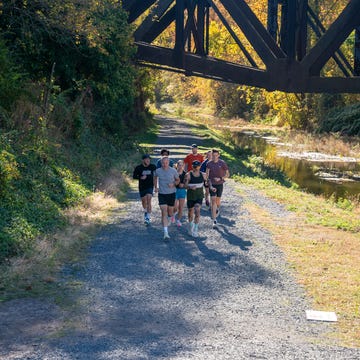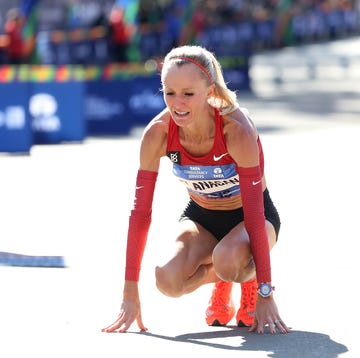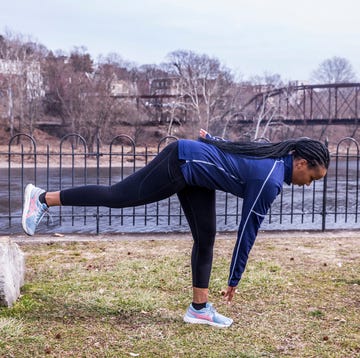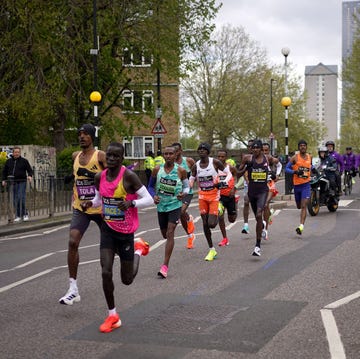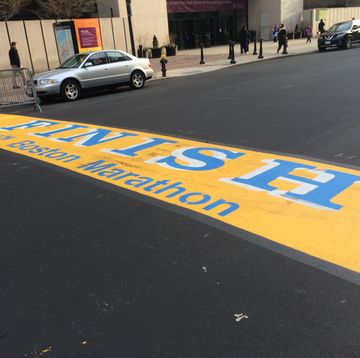Max King has always been a little extreme, known for going from competitive steeplechaser to Olympic trials marathoner to world championship mountain runner—sometimes in the span of weeks. Now running’s all-around tough guy is cashing a $30,000 check for winning the inaugural Warrior Dash World Championship this past weekend in Esparto, California.
At WDWC, King blasted around the 3.2-mile course and its 13 obstacles in 22:34. He finished almost a minute ahead of second- and third-place Hobie Call and John Yatsko, who not long ago was a top runner at Northern Arizona University. King’s cash haul was part of the race’s $100,000 purse—and was by far the largest prize he’s won as a competitive athlete.
“I like to do a lot of different things and it’s still mostly for fun,” King says. “But there’s a pretty big incentive for it now, which kind of changes the dynamic,” he says of obstacle racing’s growth and increasing financial incentives.
The 33-year-old from Bend, Oregon, is often referred to as America’s most versatile runner. He’s competed in two Olympic trials in the steeplechase, one Olympic marathon trials, in four world cross country championships and won the 2011 world mountain running championship. His half marathon best is 1:03 and his marathon PR is 2:14.
Saturday’s victory was his first after competing in four different obstacle races in the past year. In 2013 he missed the Ultra Race of Champions in September and was looking for an alternative. So, he jumped into the Atlas race in Medford, Oregon, because it looked like a good time.
“And it was a ton of fun, so I made more of an effort to do more races like that, put them on the calendar,” King says.
But the new challenge has come with a learning curve. At the Spartan Race World Championship in Vermont—a 16-mile course with a $15,000 award for the winner—King finished 12th. He thinks the double sandbag carry did him in.
“I’m not a real big guy,” he says. “I failed all the grip obstacles in the last mile too, though. That was a four-hour race. Spartan obstacles are a lot more strength-based—more hiking. What I like about Warrior Dash is that it’s runnable and the obstacles are more efficiency-based.”
The inevitable injuries—like the gash in his knee after tearing it on barbed wire during a downhill body slide—haven’t appeared to detour him from his more-traditional training. He still ran 20 miles the day after the Warrior Dash race, despite feeling “a little stiff.” King supplements his training schedule with a couple of hours of strength work, including functional exercises like pull-ups and low-weight, high-rep work.
His background in the steeplechase is likely contributing to his success as well. Other steeplechasers like Yatsko and University of Oregon steepler Kimber Mattox are also top competitors on the obstacle circuit, as well as Julia Webb, who raced this year’s U.S. steeple championships.
“It’s the mindset, to take things as they come and always be adapting,” King says.
In between the obstacle course races, King has, again, had an impressive year of ultrarunning results. He bounced back from a seventh-place finish at the Lake Sonoma 50 in April to break a long-standing course record at the Ice Age Trail 50 in May. He led the first 75 miles of June’s Western States Endurance Run, his debut for the 100-mile distance, where he held on for fourth place. Six days before the Warrior Dash World Championships he was eighth at the 44-mile Hasetsune Cup in Japan. A week before that he completed a three-day, two-night fastpack through Northern California’s Trinity Alps.
And now, preparing for the 100K World Championship on November 20, in Doha, Qatar, King is running about 100 miles per week.
And the most versatile runner doesn’t plan to focus anytime soon. After he gets back from Qatar, he promises to return to the steeplechase and the marathon before the 2016 Olympic trials.


